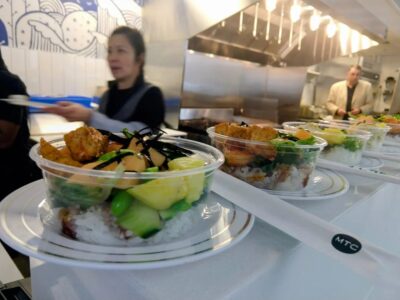If the U.S. is what it eats, this country is probably a GMO.
Americans most likely eat them every day though many may not know it. They don’t look particularly different or taste strange, but they’re foods at the center of a hotly contested debate. Genetically modified organisms (GMOs) are a controversial technology to say the least.
In his newly published book, University of Delaware professor and environmental journalist McKay Jenkins delves not only into the debate, but into the science behind GMOs as well as the role they play in the American diet and the agricultural industry.
“Clearly, genetic engineering has the potential to help solve some of the world’s pressing food and nutrition problems,” Jenkins writes. “The problem is that this technology is mostly being used not to help small farmers or improve nutrition in the developing world but to create profits for companies selling poor-quality food in the United States.”
The new book, titled Food Fight: GMOs and the Future of the American Diet, hit shelves Jan. 24. Published by Avery, it offers an extensive look into GMO culture and science. It also acts as a guide for consumers wondering what the big deal is and whether or not they should be concerned by this seemingly confusing food tech.
The publishing of Food Fight is also timely. It’s no secret that GMOs have gotten a bad rap for much of their history, but in a recent article published by the Washington Post, Jenkins’ asserts that GMOs are at a turning point. They are being marketed directly to consumers more frequently than before, and GMO convenience might finally prove enough to erase some of the hostility the public holds towards them.
“Any successful product could lift the cloud over GMOs,” he told the Post.
Food Fight also speaks of other agri-tech issues like pesticides, herbicides and how the agricultural industrial complex in the U.S. has grown to focus mainly on GMO corn and soybeans.
GMOs, according to Jenkins’ research, are actually more prevalent than many consumers would likely think. Modified corn, for example, is the basis of most animal feed as well as the origin of the corn syrup found in a lot of processed foods.
The research completed for Food Fight was literally far-reaching. Jenkins traveled across the U.S., from the East Coast all the way to Hawaii, and spoke with farmers and expert scientists with a variety of backgrounds. From small, organic farmers to people hoping to use GMOs to end world hunger, the book takes a look at GMOs from multiple angles.
Opinions on these tech-altered organisms also run the gamut. Unlike many other discussions on GMOs. however, Jenkins’ works to include moderate attitudes towards the technology in the book — not just the more publicized, highly passionate, far-leaning stances.
Food Fight also includes some of the experiences of Jenkins’ students from UD. While taking Jenkins’ classes, some of his students volunteered at a local farm. The experience helped to shed light on just how much goes into growing food and just how little they’d truly understood about farming and GMOs before.
For all his investigation and research though, Jenkins told UD’s UDaily that he believes a compromise is feasible.
“Not everyone agrees, but I think there is a possible middle path, where GMOs can be part of a sustainable agriculture system,” he said.
Join the conversation!
Find news, events, jobs and people who share your interests on Technical.ly's open community Slack

Delaware daily roundup: Over 4,000 Black-owned businesses uncovered; Dover makes rising cities list; a push for online sports betting

Delaware daily roundup: Ladybug Fest illuminates small biz; Hahnemann Hospital's biotech future; intl. politics and a Middletown project

Delaware daily roundup: DE in DC for 'Communities in Action'; diversifying the coffee supply chain; Invista's future

